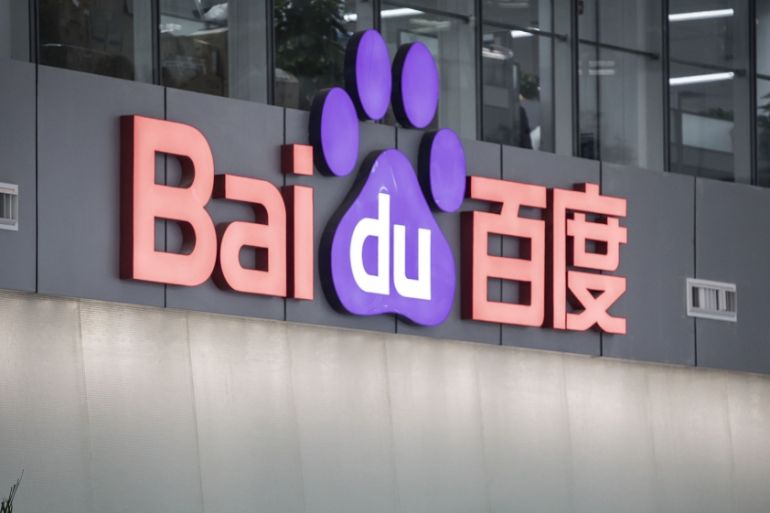Chinese search giant Baidu sees strong growth as economy recovers
Profits in the first quarter beat analyst estimates as China’s economy began opening up ahead of the US and Europe.

Chinese search engine giant Baidu Inc has forecast second-quarter revenue above expectations, as businesses reopen in the world’s second-largest economy after strict lockdowns to curb the spread of the coronavirus.
Baidu’s United States-listed shares jumped 8 percent in extended trading after the company also reported a smaller-than-expected drop in first-quarter revenue and easily beat profit estimates.
Keep reading
list of 3 itemsVast numbers of jobless will undermine China’s recovery
Huawei hits back at US for curbing access to supplies
China’s stalled economy is starting up much earlier than those of Europe and the US, which are easing restrictions gradually as they struggle with high numbers of reported infections and deaths from COVID-19, a disease caused by the novel coronavirus.
“With the pandemic coming under control in China, offline activities are rebounding and Baidu stands to benefit from a restart of the Chinese economy,” Chief Executive Officer and co-founder Robin Li said in a statement.
Baidu forecast current-quarter revenue between 25.0 billion yuan ($3.5bn) and 27.3 billion yuan ($3.8bn), while analysts on average had expected 25.55 billion yuan ($3.6bn).
Once the runaway leader in desktop search, Baidu struggled to stay relevant in the mobile era while fending off ByteDance, whose Douyin is growing users at a rapid clip and pushing down industry advertising rates. The Chinese startup is the country’s best-performing advertising platform this year in terms of impact and traffic, according to Raymond Feng, a Shanghai-based analyst with Pacific Epoch.
To compete, Baidu plans to offer subsidies to influencers and direct more traffic to them across its family of apps, including in live-streaming.
The company said daily active users for the Baidu App surged 28 percent in March to hit the 222 million mark.
“This performance is encouraging, as it shows that the worst stretch is likely over for Chinese internet companies as the economy slowly gets back to its feet and the digital ad market revives,” said Haris Anwar, senior analyst at financial markets platform Investing.com.
Revenue from Baidu’s online marketing services business, which includes search, news feeds and video apps and is a major contributor to overall sales, tumbled 19 percent to 14.24 billion yuan ($2bn) in the first quarter ended March 31.
Total revenue declined about 7 percent to 22.55 billion yuan ($3.2bn), but beat estimates of 21.93 billion yuan ($3.1bn).
Baidu in February estimated revenue between 21 billion yuan ($2.9bn) and 22.9 billion yuan ($3.2bn).
Subscribers for the company’s iQIYI – a Netflix-like video service – climbed 23 percent to 118.9 million, a benefit from stay-at-home orders. Revenue rose 9 percent, but net loss attributable to the company widened to 2.87 billion yuan ($404m) from 1.81 billion yuan ($255m).
Longer-term, Baidu is investing in artificial intelligence technology, and betting on the commercialization of that through smart speakers and self-driving cars. It was awarded contracts in March from local governments in cities, including Chongqing and Hefei, to build smart transportation infrastructure such as road sensors, part of China’s drive to spur the economy through investment in technology.
Oversight by Beijing remains a problem. In April, Chinese regulators suspended some key channels in Baidu’s flagship mobile app, citing vulgar content. That two-week punishment could reduce revenue from its core search and feed business in the June quarter by less than 2 percent, according to an estimate by Jefferies analyst Thomas Chong.